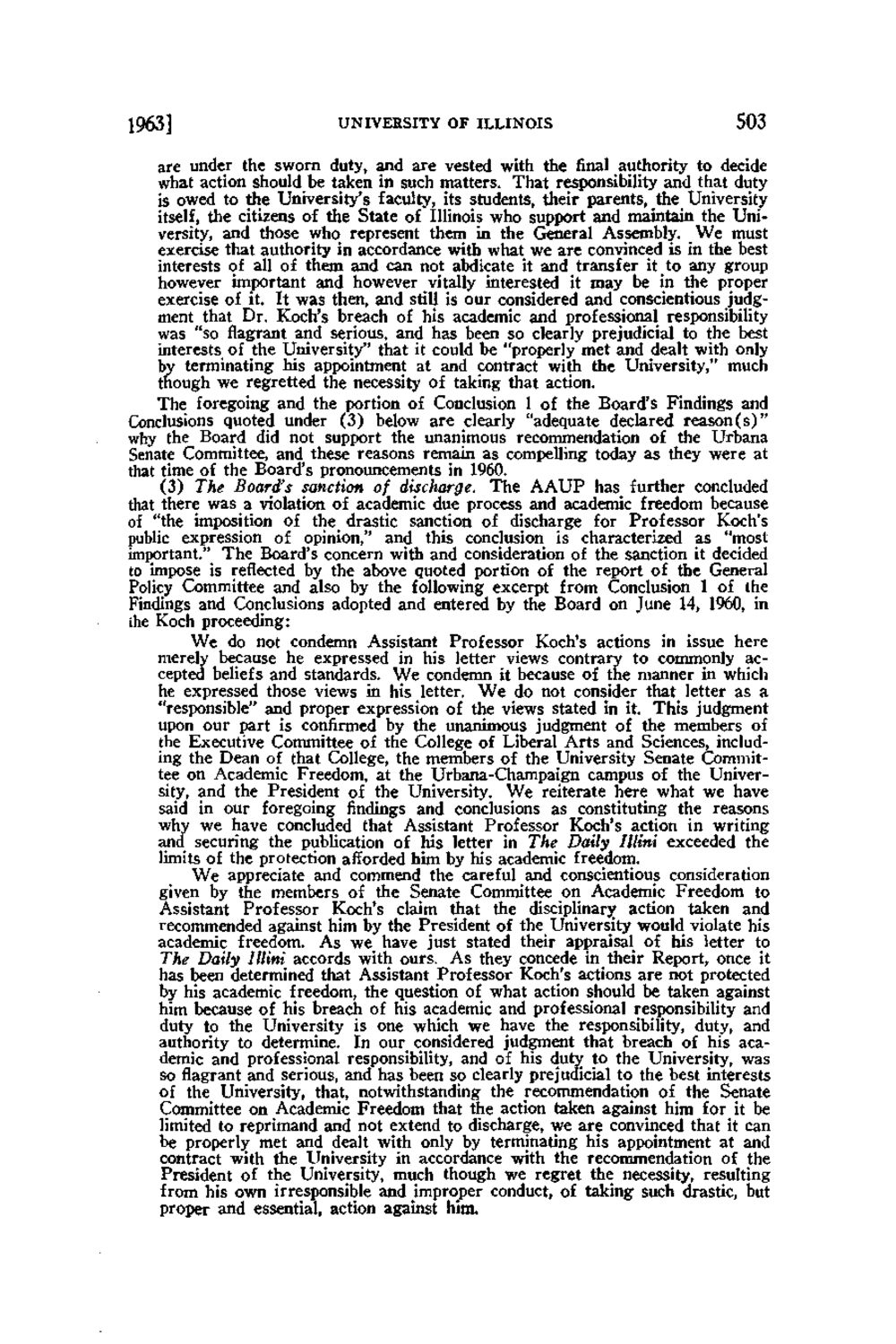| |
| |
Caption: Board of Trustees Minutes - 1964
This is a reduced-resolution page image for fast online browsing.

EXTRACTED TEXT FROM PAGE:
1963] UNIVERSITY OF ILLINOIS 503 are under the sworn duty, and are vested with the final authority to decide what action should be taken in such matters. That responsibility and that duty is owed to the University's faculty, its students, their parents, the University itself, the citizens of the State of Illinois who support and maintain the University, and those who represent them in the General Assembly. W e must exercise that authority in accordance with what we are convinced is in the best interests of all of them and can not abdicate it and transfer it to any group however important and however vitally interested it may be in the proper exercise of it. It was then, and stiU is our considered and conscientious judgment that Dr. Koch's breach of his academic and professional responsibility was "so flagrant and serious, and has been so clearly prejudicial to the best interests of the University" that it could be "properly met and dealt with only by terminating his appointment at and contract with the University," much though we regretted the necessity of taking that action. The foregoing and the portion of Conclusion 1 of the Board's Findings and Conclusions quoted under (3) below are clearly "adequate declared r e a s o n ( s ) " why the Board did not support the unanimous recommendation of the Urbana Senate Committee, and these reasons remain as compelling today as they were at that time of the Board's pronouncements in 1960. (3) The Board's sanction of discharge. The A A U P has further concluded that there was a violation of academic due process and academic freedom because of "the imposition of the drastic sanction of discharge for Professor Koch's public expression of opinion," and this conclusion is characterized as "most important." The Board's concern with and consideration of the sanction it decided to impose is reflected by the above quoted portion of the report of the General Policy Committee and also by the following excerpt from Conclusion 1 of the Findings and Conclusions adopted and entered by the Board on June 14, 1960, in ihe Koch proceeding: We do not condemn Assistant Professor Koch's actions in issue here merely because he expressed in his letter views contrary to commonly accepted beliefs and standards. We condemn it because of the manner in which he expressed those views in his letter. W e do not consider that letter as a "responsible" and proper expression of the views stated in it. This judgment upon our part is confirmed by the unanimous judgment of the members of the Executive Committee of the College of Liberal Arts and Sciences, including the Dean of that College, the members of the University Senate Committee on Academic Freedom, at the Urbana-Champaign campus of the University, and the President of the University. We reiterate here what we have said in our foregoing findings and conclusions as constituting the reasons why we have concluded that Assistant Professor Koch's action in writing and securing the publication of his letter in The Daily Mini exceeded the limits of the protection afforded him by his academic freedom. We appreciate and commend the careful and conscientious consideration given by the members of the Senate Committee on Academic Freedom to Assistant Professor Koch's claim that the disciplinary action taken and recommended against him by the President of the University would violate his academic freedom. As we have just stated their appraisal of his letter to The Daily Illini accords with ours. As they concede in their Report, once it has been determined that Assistant Professor Koch's actions are not protected by his academic freedom, the question of what action should be taken against him because of his breach of his academic and professional responsibility and duty to the University is one which we have the responsibility, duty, and authority to determine. In our considered judgment that breach of his academic and professional responsibility, and of his duty to the University, was so flagrant and serious, and has been so clearly prejudicial to the best interests of the University, that, notwithstanding the recommendation of the Senate Committee on Academic Freedom that the action taken against him for it be limited to reprimand and not extend to discharge, we are convinced that it can be properly met and dealt with only by terminating his appointment at and contract with the University in accordance with the recommendation of the President of the University, much though we regret the necessity, resulting from his own irresponsible and improper conduct, of taking such drastic, but proper and essential, action against him.
| |